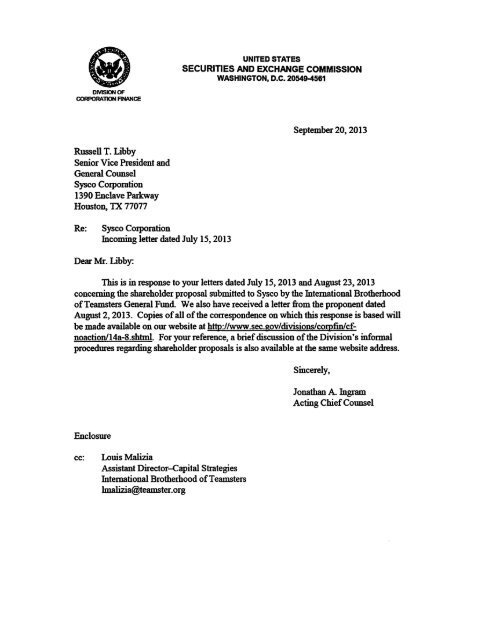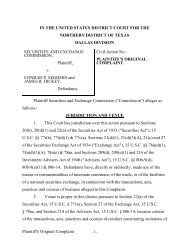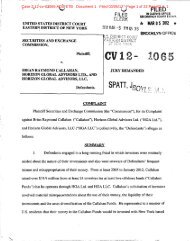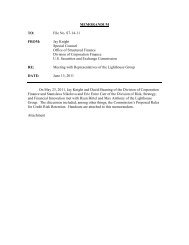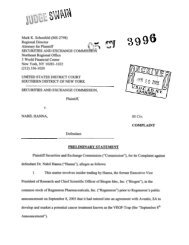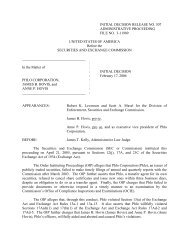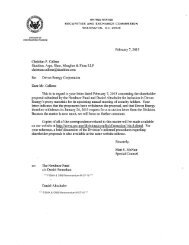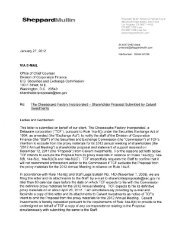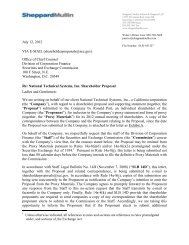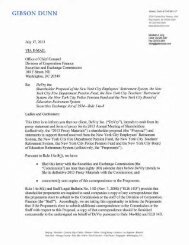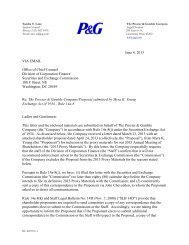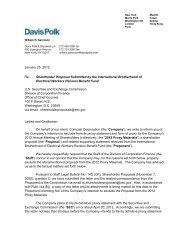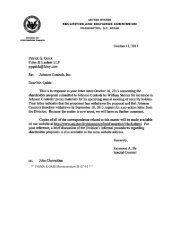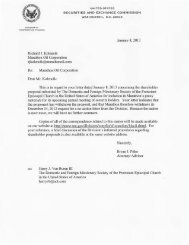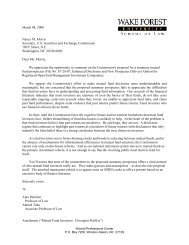httn://www.sec.gov/divisions/comfinlcfnoaction/14a-8.shtml
Sysco Corporation; Rule 14a-8 no-action letter - US Securities and ...
Sysco Corporation; Rule 14a-8 no-action letter - US Securities and ...
Create successful ePaper yourself
Turn your PDF publications into a flip-book with our unique Google optimized e-Paper software.
UNITED STATES <br />
SECURITIES AND EXCHANGE COMMISSION <br />
WASHINGTON, D.C. 20549-4561 <br />
DIVISION OF<br />
CORPORATION FINANCE<br />
September 20, 2013<br />
Russell T. Libby<br />
Senior Vice President and<br />
General Counsel<br />
Sysco Co1p0ration<br />
1390 Enclave Parkway<br />
Houston, TX 77077<br />
Re:<br />
Sysco Co1p0ration<br />
Incoming letter dated July 15,2013<br />
Dear Mr. Libby:<br />
This is in response to your letters dated July 15, 2013 and August 23, 2013<br />
concerning the shareholder proposal submitted to Sysco by the International Brotherhood<br />
ofTeamsters General Fund We also have received a letter from the proponent dated<br />
August 2, 2013. Copies ofall ofthe correspondence on which this response is based will<br />
be made available on our website at <strong>httn</strong>://<strong>www</strong>.<strong>sec</strong>.<strong>gov</strong>/<strong>divisions</strong>/<strong>comfinlcfnoaction</strong>/<strong>14a</strong>-<strong>8.shtml</strong>.<br />
For your reference, a briefdiscussion ofthe Division's informal<br />
procedures regarding shareholder proposals is also available at the same website address.<br />
Sincerely,<br />
Jonathan A. Ingram<br />
Acting ChiefCounsel<br />
Enclosure<br />
cc:<br />
Louis Malizia<br />
Assistant Director-Capital Strategies<br />
International Brotherhood ofTeamsters<br />
Jmalizia@teamster.org
September 20, 2013<br />
Response ofthe Office of Chief Counsel<br />
Division of Corporation Finance<br />
Re:<br />
Sysco Corporation<br />
Incoming letter dated July 15, 2013<br />
The proposal asks the board to adopt a policy that in the event ofa change of<br />
control, there shall be no acceleration ofvesting ofany equity award granted to any<br />
named executive officer as defined in Item 402 ofRegulation S-K, provided, however,<br />
that the board's compensation committee may provide that any unvested award will vest<br />
on a partial, pro rata basis.<br />
There appears to be some basis for your view that Sysco may exclude the proposal<br />
under rule <strong>14a</strong>-8(i)(9). You represent that matters to be voted on at the upcoming annual<br />
shareholders' meeting include a proposal sponsored by Sysco to approve the 2013<br />
Long-Term Incentive Plan. You indicate that the proposal would directly conflict with<br />
Sysco's proposal. You also indicate that inclusion ofthe proposal and Sysco's proposal in<br />
Sysco's proxy materials would present alternative and conflicting decisions for<br />
shareholders and would create the potential for inconsistent and ambiguous results.<br />
Accordingly, we will not recommend enforcement action to the Commission ifSysco<br />
omits the proposal from its proxy materials in reliance on rule <strong>14a</strong>-8(i)(9). In reaching<br />
this position, we have not found it necessary to address the alternative basis for omission<br />
upon which Sysco relies.<br />
Sincerely,<br />
Michael J. Reedich<br />
Special Counsel
DIVISIO'l\J OF CORPORATiOl~ FINANCE <br />
INFORMAL PROCEDURES REGARDING SHAREBOLDER PROPOSALS <br />
' • • • o ' a<br />
~e Division of Corpo~tion Finance believes that its responsibility wit~ respect to<br />
ll)atters arisitt$ under Rule <strong>14a</strong>-8 {17 CFR:240.<strong>14a</strong>-8], as with other matters Wider th~ proxy<br />
.rules, is to -~d those who inust comply With the rule by offering informal advice and suggestions<br />
. .<br />
and'to determine, initially, whether or not it may be appropriate in a particular matter to.<br />
recQmmend_ e~orce~ent action to the Commission. In COfi:I1ection with a shareholde·r proposal<br />
~der Rule.l4a-8, the Division's.staff conside~s th~ iriformatio·n ruffiished to it·by the Company<br />
in support ofits interitiontQ exclude Ute proposals from tbe Company's proxy materials, a(\ well<br />
as any infonn~tion furnished by the proponent or-the p~oponent's representative.<br />
. Although Rule l4a-8(k) does nol require any comm~cations from shareholders to the<br />
C~nu:Uission's ~~ the staff will always consider information concerning alleged violations of<br />
· the· statutes a~inistered by the-Commission, including argtunent as to whether or notactivities <br />
propos~ tq· be-taken ·would be violative·of th~ ·statute ornile inyolv~d. The receipt by the staff <br />
ofsuch information; however, should not be construed as changing the stafrs informal . <br />
pr~ur~ and--proxy review ·into a formal or adversary procedure. <br />
It~is important to note that the stafrs and. Commissio~'s no-action responses to<br />
RUle <strong>14a</strong>:-8(j)submissions reflect only infornial views. The d~tenninations·reached in these noactio~<br />
l~tters do not ~d cannot adjudicate the ~erits ofa company's position With respect to the<br />
proposal. Only acourt such a5 a U.S. District Court.can decide whethe~a company is obligated<br />
·.to inclU~(; shareh.older.proposals in its proxy materials·. Accordingly a discretionary .<br />
determination not to reconunend or take Commission enforcement action, does not preclude a<br />
proponent, or any shareholder o(a ·('.Ompany, fron1 pursuing any rights he or sh
Sysco Corporation<br />
1390 Enclave Parkway<br />
Houston, Texas 77077<br />
T 281.584.1390<br />
F 281.584.2510<br />
August 23,2013<br />
Securities and Exchange Commission <br />
Office ofthe ChiefCounsel <br />
Division of Corporation Finance <br />
100 F Street, NE <br />
Washington, DC 20549 <br />
RE:<br />
Sysco Corporation- Stockholder Proposal ofthe International Brotherhood ofTeamsters<br />
Ladies and Gentlemen:<br />
On July 15, 2013, I submitted a letter (the "July 15, 2013 letter") on behalf ofSysco Corporation<br />
(the "Company") informing the staffofthe Division ofCorporation Finance (the "Staff') that the<br />
Company intends to omit from its proxy materials for its 2013 Annual Meeting ofStockholders<br />
(the "2013 Annual Meeting") a stockholder proposal (the "Proposal") submitted by the<br />
International Brotherhood ofTeamsters (the "Proponent"). The July 15,2013 letter also<br />
requested the advice ofthe Staffthat it will not recommend enforcement action ifthe Company<br />
omits the Proposal from its proxy materials for the 2013 Annual Meeting.<br />
By a letter dated August 2, 2013, the Proponent submitted a response to the July 15, 2013letter,<br />
asserting that the relief sought in the July 15, 2013 letter should not be granted. For the reasons<br />
set forth in the July 15,2013 letter and in this letter, the Company continues to believe that the<br />
Proposal may be excluded from the proxy materials for its 2013 Annual Meeting and that the<br />
Company's request for no-action relief should be granted.<br />
In accordance with StaffLegal Bulletin No. 14D, the Company is submitting this letter via e-mail<br />
to stockholdemroposals@<strong>sec</strong>.<strong>gov</strong> and is concurrently sending a copy ofthis correspondence via<br />
e-mail to the Proponent.<br />
In addition, the Company hereby confrrms that a Company proposal to adopt the Sysco<br />
Corporation Long-Term Incentive Plan (the "Plan") will be included in the 2013 Proxy<br />
Materials. The Plan, as proposed for stockholder approval, will contain the provision relating to<br />
acceleration ofvesting and exercisability ofawards set forth in the July 15, 2013 letter.<br />
I. The Proposal May be Excluded Pursuant to Rule <strong>14a</strong>-8(i)(9) Because it Directly <br />
Conflicts with the Company's Own Proposal to Adopt the Company's 2013 Long-Term <br />
Incentive Plan <br />
DB1175285228.2 1
The Proponent argues that the Proposal should not be excluded because it includes language<br />
stating that the Proposal "should be implemented after the 2013 Annual Meeting ofStockholders<br />
so as not to violate existing contractual obligations or the terms of any benefit plan currently in<br />
effect or being voted on at the 2013 Annual Meeting of Stockholders." The Proponent asserts<br />
that the explicit reference to a plan being voted on at the 2013 Annual Meeting distinguishes the<br />
Proposal from the substantially similar proposals addressed in McKesson Corp. (May I, 2013 ),<br />
Starwood Hotels & Resorts Worldwide (March 21, 2013) and Verizon Communications<br />
(February 8, 2013). This is a distinction without substance. The proponents in McKesson,<br />
Starwood Hotels and Verizon each argued that no conflict existed between the stockholder<br />
proposal and management's proposal for adoption ofa new or amended equity plan because the<br />
stockholder proposal could not be implemented until after stockholder approval ofthe plan and<br />
the stockholder proposal explicitly stated that it is to be implemented "so as not to affect any<br />
contractual rights in existence on the date this proposal is adopted." In other words, the<br />
proponents argued that the timing ofimplementation ofthe proposal, coupled with the restriction<br />
on implementation so as not to affect contractual rights, resulted in there being no conflict<br />
between the stockholder proposal and the plan adoption proposal. The Staff did not accept this<br />
argument and should not accept the substantively identical argument made by the Proponent.<br />
The mere fact that the Proponent has added specific reference to a benefit plan being voted on at<br />
the meeting does not change the analysis. Each ofthe proposals, including the Proposal, (i)<br />
called for policies restricting acceleration ofvesting that conflicted with change ofcontrol<br />
provisions in an equity plan to be submitted for stockholder vote at the same meeting at which<br />
the proposal was intended to be considered; (ii) could not be implemented until after the plan<br />
was approved; and (iii) contained language that would preclude implementation ofthe policy in<br />
the event implementation would conflict with contractual rights, including rights derived from a<br />
conflicting provision in the equity plan.<br />
In this regard, we believe the Proponent mischaracterizes the argument ofthe proponents in<br />
McKesson, Starwood Hotels and Verizon when it states ''the proponents explained to the Staff"<br />
that it was the proponents' "intention" that the companies frrst adopt the new plans and then<br />
consider the stockholder proposal to limit acceleration ofequity awards in connection with<br />
change ofcontrol, but the language in their proposals "did not make explicit this intention." The<br />
Proponent seeks to distinguish the Proposal by stating that it "added new language ... to make<br />
explicit the Proponent's intention." However, the proponents' arguments had nothing to do with<br />
intent; indeed the words "intent" or "intention" do not appear in their arguments addressing the<br />
issue. Instead, as noted above, the proponents made essentially the same timing of<br />
implementation argument as the Proponent now makes.<br />
We believe that the Proponent itself expressed the fundamental principle supporting rejection of<br />
its timing ofimplementation argument. On page 4 of its letter, the Proponent states: "In the end,<br />
shareholders are voting on a policy matter." We agree. The policy ma:tter that stockholders are<br />
voting on is whether there should be a prohibition on acceleration ofvesting ofany equity award<br />
granted to a named executive officer in connection with a change in control (subject to a limited<br />
exception for pro-rata vesting). As stated in the July 15, 2013 letter, it is the restraint on vesting,<br />
not the timing ofthe Proposal's implementation, that is the crux ofthe Proposal, and the restraint<br />
on vesting, as a policy matter, clearly conflicts with the Company's proposal calling for<br />
DB11752852282<br />
2
stockholder approval ofthe Plan, which contains a provision expressly requiring such vesting. <br />
Inclusion ofboth the Company's proposal and the Proposal in the proxy materials for the 2013 <br />
Annual Meeting would, therefore, present alternative and conflicting decisions for stockholders <br />
and would create the potential for inconsistent and ambiguous results. <br />
Finally, the Proponent appears to take issue with our statement that "a reader ofthe supporting<br />
statement would readily conclude that the policy goals promoted by the Proponent are simply<br />
inconsistent with the change in control acceleration provisions contained in the Plan, regardless<br />
ofthe timing ofimplementation ofthe policy." The Proponent argues that if"timing did not<br />
matter, the Company's argument that the Proposal conflicts with its policy would be frozen in<br />
time, and the Proponent could never file the Proposal, whose request will always be at odds with<br />
the Company's current policy." This argument evidences an apparent misunderstanding ofthe<br />
operation ofRu1e <strong>14a</strong>-8(i)(9). The fact that a stockholder proposal promotes a policy that<br />
conflicts with a company's existing compensation policies or practices would not, by itself,<br />
enable exclusion ofthe proposal under Rule <strong>14a</strong>-8(i)(9). Rather, it is the fact that, as is the case<br />
here, the proposal is in dir~ct conflict with a company proposal that will be submitted to<br />
stockholders at the same meeting that triggers the Rule <strong>14a</strong>-8(i)(9) exclusion.<br />
For the foregoing reasons, as well as those addressed in the July 15, 2013letter, we believe that <br />
the Proposal may be excluded from the proxy materials for the 2013 Annual Meeting under <br />
Rule <strong>14a</strong>-8(i)(9) because the Proposal directly conflicts with the Company's proposal to be <br />
submitted to stockholders at the 2013 Annual Meeting. <br />
ll. The Proposal May be Excluded Under Rule <strong>14a</strong>-8(i)(3) Because it is Impermissibly <br />
Vague and Indefinite so as to be Inherently Misleading <br />
The Proponent's arguments fail to address the Company's fundamental arguments supporting<br />
exclusion under Rule <strong>14a</strong>-8(i)(3). The fact that the Proponent determined to replace the terms<br />
"senior executive" with "named executive officer'' is irrelevant to the issue ofwhether the<br />
Proposal is vague and indefinite; the term "named executive officer," in the context ofthe<br />
Proposal and the Proponent's supporting statement, would be vague and indefinite regardless of<br />
the evolution ofits inclusion in the Proposal. Moreover, the Proponent mischaracterizes the<br />
Company's argument, stating that "Sysco claims confusion about which employees would be<br />
covered by the policy." As indicated in the July 15,2013 letter, the Company is not confused as<br />
to which employees would be covered; rather, because the Proposal and the Proponent's<br />
supporting statement fail to adequately disclose to the stockholders who would constitute a<br />
"named executive officer," it is the stockholders who would be confused. As noted in the<br />
July 15letter, there are several situations where the application ofthe definition of"named<br />
executive officer" would lead to results that would be counterintuitive to a stockholder. Contrary<br />
to the Proponent's assertions, these are not merely situations "where one employee slips into or<br />
out ofthe group ofnamed executive officers." For example, we believe a stockholder would ~e<br />
very surprised to learn that the policy would not cover equity awards to any newly appointed<br />
executive officer, including a newly appointed chief executive officer or chieffinancial officer.<br />
The July 15,2013 letter provided ci~tions to no-action letters where the Staffpermitted <br />
exclusion ofproposals requesting that a company adopt a particular definition or set of <br />
DB1/75285228.2<br />
3
guidelines from an external source when the proposal or supporting statement failed to describe <br />
the substantive provisions ofthe referenced definition or set ofguidelines. The fact that the <br />
Proposal references a definition in a Commission regulation should not lead to a different result. <br />
As noted in the July 15, 2013 letter and above, the meaning of"named executive officer" is not <br />
intuitive. Absent some explanation ofthe application ofthe term, a stockholder simply will not <br />
be made aware ofsituations where persons might be included or excluded from the scope ofthe <br />
Proposal in a manner that likely will not be anticipated. <br />
Indeed, in a different context, the inadequacy ofa mere reference to the defined term, "named<br />
executive officer" was acknowledged by the Commission in adopting amendments to Item 5.02<br />
ofForm 8-K in 2006. Uncertainty concerning the application ofthe term, "named executive<br />
officer"-led the Commission to include Instruction 4 to Item 5.02 ofForm 8-K, which sets forth<br />
the meaning ofthe term "named executive officer" in the context ofItem 5.02 disclosures. The<br />
Commission stated that this instruction was added in response to a commenter who noted that<br />
"greater clarity is needed to determine how the standard should be applied for current Form 8-K<br />
reporting throughout the year." See Executive Compensation and Related Person Disclosure,<br />
Release No. 33-8732A (August 29, 2006), text accompanying notes 383 and 384.<br />
In sum, the application ofthe term "named executive officer," is not obvious and, in the absence<br />
ofany explanation ofthe meaning ofthe term in the Proposal or the Proponent's supporting<br />
statement, its application can lead to results that a stockholder likely would consider anomalous.<br />
Despite the Proponent's assertion that it replaced the term "senior executive" with "named<br />
executive officer" to "remove any uncertainty," we believe the Proponent's use ofthe term, in<br />
the context ofthe Proposal and the Proponent's supporting statement, would have the opposite<br />
effect.<br />
For the foregoing reasons, as well as those set forth in the July 15, 2013 letter, we believe that <br />
the Proposal may be excluded from the proxy materials for the 2013 Annual Meeting under <br />
Rule <strong>14a</strong>-8(i)(3) because it is vague and indefinite so as to be inherently misleading. <br />
III.<br />
Conclusion<br />
For the foregoing reasons as well as the reasons set forth in the July 15, 2013 letter, the Company<br />
respectfully requests that the Staffconfirm that it would not recommend enforcement action if<br />
the Company omits the Proposal from its proxy materials for the 2013 Annual Meeting.<br />
Ifyou have any questions or require any additional information, please call me at 281-584-4154,<br />
or Alan Singer ofMorgan, Lewis & Bockius LLP at 215-963-5224.<br />
Sincer~ly,<br />
·:<br />
··~ussell.T.,.Lib y. .<br />
.<br />
Senior Vice President and General Counsel<br />
DB1/75285228.2<br />
4
INTERNATIONAL BROTHERHOOD OF TEAMSTERS<br />
JAMES P. HOFFA<br />
General President<br />
KEN HALL<br />
General Secretary-Treasurer<br />
25 Louisiana Avenue. NW 202.624.6800<br />
Washington. DC 20001<br />
<strong>www</strong>.teamster.org<br />
August 2, 2013<br />
VIA EMAIL<br />
U.S. Securities and Exchange Commission<br />
Office ofthe ChiefCounsel<br />
Division ofCorporation Finance<br />
I00 F Street, NE<br />
Washington, DC 20549<br />
Re:<br />
Shareholder proposal submitted to Sysco Corporation by the<br />
International Brotherhood ofTeamsters General Fund<br />
Ladies and Gentlemen,<br />
By letter dated July 15, 2013, Sysco Corporation ("Sysco" or the<br />
''Company") asked that the Office of the Chief Counsel of the Division of<br />
Corporation Finance (the ''Staff') confirm that it will not recommend<br />
enforcement action if Sysco omits a shareholder proposal (the "Proposal")<br />
submitted pursuant to the Commission's Rule <strong>14a</strong>-8 by the International<br />
Brotherhood ofTeamsters General Fund (the "Proponent").<br />
In accordance with Securities and Exchange Commission ("SEC")<br />
StaffLegal Bulletin No. 14D (Nov. 7, 2008), this response is being e-mailed<br />
to shareholderproposals@<strong>sec</strong>.<strong>gov</strong>. A copy of this response will be emailed<br />
and sent by regular mail to Sysco.<br />
The Proposal requests that Sysco adopt a policy that the Company<br />
will not automatiqally accelerate the vesting ofequity awards in the event of<br />
a change in control, and instead allow equity to vest on a partial or pro rata<br />
basis.
U.S. Sec~ties and Exchange Commission<br />
August 2, 2013<br />
Page 2 of4<br />
Sysco claims that it may exclude the Proposal in reliance on (i) Rule<br />
<strong>14a</strong>-8(i)(9) because it directly conflicts with a management proposal and (ii)<br />
·Rule <strong>14a</strong>-8(i)(3) because it is materially false and misleading. The Proponent<br />
disputes Sysco' s arguments for reasons explained below.<br />
(i) The Proposal does not conflict with the management proposal<br />
The Proposal explicitly states its consideration by the board would<br />
come after the annual meeting, where the management proposal on the<br />
Company's 2013 Long-Tenn Incentive Plan ("LTIP") will be proposed. The<br />
last sentence of the resolved clause reads, "This policy should be<br />
implemented after the 2013 annual meeting of shareholders so as not to<br />
violate existing contractual obligations or the terms or any compensation or<br />
benefit plan currently in effect or being voted on at the 2013 annual<br />
shareholders meeting." The Company accuses the Proponent of making "an<br />
obvious attempt to circumvent the provisions of Rule <strong>14a</strong>-8(i)(9)" by<br />
including such language. Working within the bounds of the rule's basis for<br />
exclusion, however is not circumvention-it is compliance.<br />
As the Company notes, several companies submitted requests to the<br />
Staff for no action relief this year after receiving nearly identical proposals,<br />
including McKesson Corporation (May I, 2013), Starwood Hotels &<br />
Resorts Worldwide, Inc. (March 21, 2013) and Verizon Communications<br />
Inc. (Feb. 8, 20 13). In each of these instances, the proponents explained to<br />
the Staff that the intention was for the companies to frrst adopt their new<br />
incentive plans, if approved by shareholders at the annual meeting, and<br />
<strong>sec</strong>ond to consider the shareholder proposal to limit the acceleration of<br />
equity awards during a change in control. Notwithstanding the explanations<br />
given in response to the requests for no action relief, admittedly the language<br />
in the proposals did not make explicit this intention on timing. The .Staff<br />
permitted the companies to omit the proposals on the grounds that the<br />
shareholder proposals could conflict with the management proposals on new<br />
incentive plans. In response to these Staff decisions and to ensure the<br />
Proposal stands on its own without need for additional explanation, the<br />
Proponent added new language in time for the filing at Sysco to make<br />
explicit the Proponent's intention to avoid conflict with a management<br />
proposal.
U.S. Securities and Exchange Commission<br />
August 2, 2013<br />
Page 3 of4<br />
The Company's argument in the last paragraph of page four of its<br />
letter that the timing of the implementation of the Proposal is not critical is<br />
incomprehensible. Iftiming did not matter, the Company's argument that the<br />
Proposal conflicts with its policy would be frozen in time and the Proponent<br />
could never file the Proposal, whose request will always be at odds with the<br />
Company's current policy. The proposal is a reaction to company policies<br />
that allow for automatic acceleration of equity vesting during a change in<br />
control. What is already in place in every instance where the proposal is<br />
filed is a company policy that is different than what's being proposed. The<br />
Proposal seeks to address one discrete aspect within a large incentive plan.<br />
Sysco does not need to return to the drawing board to redesign its L TIP<br />
should shareholders vote in strong support for the stockholder Proposal. The<br />
Proposal is forward looking and simply asks the Company to consider the<br />
policy after shareholders vote on all the other items on the ballot, including a<br />
possible management proposal to approve the L TIP. This is the same<br />
process at play when similar proposals are filed at companies that are not<br />
submitting an incentive plan to a shareholder vote at the same meeting. The<br />
purpose ofthe Proposal is to improve upon the Company's existing LTIP.<br />
(ii)Named Executive Officer is not a vague or misleading term<br />
Another trend among companies seeking no action relief from<br />
proposals on limiting accelerated vesting this year has been to argue that the<br />
term "senior executive" is vague and misleading because it offers no<br />
concrete definition for which employees are covered by the proposals. For<br />
example, see McKesson Corpor-ation (May 1, 2013) and Starwood Hotels &<br />
Resorts Worldwide, Inc. (March 21, 2013). The answer to the question of<br />
which employees are covered is a simple one: any employee that would<br />
receive accelerated vesting of equity in a change in control scenario would<br />
be covered by the policy. None ofthe companies targeted for these proposals<br />
had policies that varied according to recipient. The terms guiding the<br />
acceleration of equity are defined in the incentives plans and presumably<br />
anyone participating in such a plan would be subject to the same rules.<br />
Although the Staff did not concur with McKesson Corporation or<br />
Starwood Hotels & Resorts Worldwide, Inc. that argued the term "senior<br />
executive" is vague and misleading, the Proponent chose to replace the term
U.S. Securities and Exchange Commission<br />
August 2, 2013<br />
Page4 of4<br />
"senior executive" with "named executive officer" in this Proposal to<br />
remove any uncertainty. Despite the clarity of the description, Sysco claims<br />
confusion about which employees would be covered by the policy. The<br />
Company writes, "the mere reference to the source of the definition is not<br />
sufficient to cure the vague and indefinite nature of the term named<br />
executive officer." On the contrary, the sole purpose ofdefining a term is to<br />
remove its indefinite nature. This is especially true in this instance where<br />
the referenced definition comes from the Securities and Exchange<br />
Commission, which regulates the entire process under which we are engaged<br />
in this debate. If such a well-defined and commonly used term like "named<br />
executive officer'' raises confusion, it is difficult to believe the perfect words<br />
exist to describe senior executives, short of identifying them by name.<br />
In the end, shareholders are voting on a policy matter. Whether one<br />
employee slips into or out of the group of named executive officers in a<br />
particular year is beside the point. The Proposal allows shareholders to<br />
weigh in on whether equity awards should automatically accelerate in a<br />
change in control. It is the Company's role is to decide how best to<br />
implement a policy change and how to treat unique cases.<br />
For the foregoing reasons, the Proponent believes that the relief<br />
sought in Sysco's no action letter should not be granted. If you have any<br />
questions, please feel free to contact Louis Malizia, Assistant Director<br />
Capital Strategies Department, (202) 624-6930 or lmalizia@teamster.org.<br />
Sincerely,<br />
KH/Im<br />
cc: Russell T. Libby<br />
Senior Vice President and General Counsel<br />
Sysco Corporation<br />
Ken Hall<br />
General Secretary-Treasurer
sysco·<br />
Good t h i ngs<br />
July 15, 2013<br />
VIA ELECTRONIC MAIL<br />
Sysco Corporation<br />
1390 Enclave Parkway<br />
Ho ust on, TX 77077<br />
sysco. com<br />
Securities and Exchange Commission<br />
Office of Chief Counsel<br />
Division of Corporation Finance<br />
100 F Street, NE<br />
Washington, DC 20549<br />
RE :<br />
Sysco Corporation- Stockholder Proposal of the International Brotherhood of Teamsters<br />
Ladies and Gentlemen:<br />
I am writing on behalf of Sysco Corporation, a Delaware corporation (the " Company") to inform<br />
you that the Company intends to omit from its proxy materials for its 2013 Annual Meeting of<br />
Stockholders (the "20 13 Annual Meeting") a stockholder proposal (the "Proposal") submitted by<br />
the International Brotherhood of Teamsters (the "Proponent"). For the reasons set forth below,<br />
the Company is requesting advice of the staff ofthe Division of Corporation Finance (the<br />
" Staff') that it will not recommend enforcement action ifthe Company omits the Proposal from<br />
its proxy materials for the 2013 Annual Meeting in reliance on Rule <strong>14a</strong>-8(i).<br />
In accordance with Rule <strong>14a</strong>-8(i), the Company is submitting this letter to the Securities and<br />
Exchange Commission (the "Commission") no later than 80 calendar days before the Company<br />
intends to file definitive proxy materials relating to the 2013 Annual Meeting, and is<br />
concurrently sending a copy ofthis correspondence to the Proponent.<br />
In addition, pursuant to Rule <strong>14a</strong>-8(k) and Section E ofStaffLegal Bulletin No. 14D<br />
(November 7, 2008), the Company requests that the Proponent copy the undersigned on any<br />
correspondence it may choose to submit to the Staff in response to this submission.<br />
I. The Proposal<br />
The Proposal reads as follows:<br />
RESOLVED: The shareholders ask the Board ofDirectors to adopt a<br />
policy that in the event of a change in control (as defined under any<br />
applicable employment agreement, equity incentive plan or other plan),<br />
there shall be no acceleration of vesting of any equity award granted to<br />
any named executive officer (as defined in Item 402 under<br />
Regulations (sic) S-K) provided, however, that the board ' s Compensation
Securities and Exchange Commission<br />
July 15, 2013<br />
Page 2<br />
Committee (the "Committee") may provide in an applicable grant or<br />
purchase agreement that any unvested award will vest on a partial, pro<br />
rata basis up to the time of the executive's termination, with such<br />
qualifications for an award as the Committee may determine.<br />
For purposes of this Policy, "equity award" means an award granted under<br />
an equity incentive plan as defined in Item 402 ofthe SEC's<br />
Regulation S-K, which addresses executive compensation. This policy<br />
should be implemented after the 2013 annual meeting of shareholders so<br />
as not to violate existing contractual obligations or the terms of any<br />
compensation or benefit plan currently in effect or being voted on at the<br />
2013 annual shareholders meeting.<br />
A copy of the Proposal, the Proponent's statement in support of the Proposal and related<br />
correspondence is attached to this letter as Exhibit A.<br />
II.<br />
Basis for Exclusion<br />
The Company believes that the Proposal may be omitted from the proxy materials for the<br />
2013 Annual Meeting because (i) the Proposal directly conflicts with the Company's own<br />
proposal to adopt the 2013 Long-Term Incentive Plan and (ii) the Proposal is impermissibly<br />
vague and indefinite so as to be inherently misleading.<br />
III.<br />
Discussion<br />
A. The Proposal May be Excluded Pursuant to Rule <strong>14a</strong>-8(i)(9) Because it<br />
Directly Conflicts with the Company's Own Proposal to Adopt the<br />
Company's 2013 Long-Term Incentive Plan.<br />
Rule l4a-8(i)(9) permits a company to exclude a stockholder proposal from its proxy<br />
materials "[i]fthe proposal directly conflicts with one of the company's own proposals to be<br />
submitted to stockholders at the same meeting." The Commission has stated that the proposals<br />
need not be "identical in scope of focus" in order for this exclusion to be available. Exchange<br />
Act Release No. 34-40018, n.27 (May 21, 1998).<br />
The Company is proposing to adopt the Sysco Corporation 2013 Long-Term Incentive<br />
Plan (the "Plan"), which will provide for, among other things, equity-based awards. If the<br />
proposed Plan is approved by the Company's Board of Directors, the Company will submit the<br />
Plan to its stockholders for approval at the 2013 Annual Meeting. The Company will confirm in<br />
a supplemental letter to the Staff no later than August 30,2013 that a proposal seeking<br />
stockholder approval of the Plan, including the provision described below, will be included as a<br />
Company-sponsored proposal in the Company's proxy materials for the 2013 Annual Meeting.<br />
The Plan will include the following provision relating to acceleration ofvesting and<br />
exercisability of awards following a change in control of the Company:
Securities and Exchange Commission<br />
July 15, 2013<br />
Page 3<br />
Unless otherwise set forth in an Award Agreement, if (x) a Change of<br />
Control occurs and (y) during the period commencing on the date that is<br />
12 months prior to the occurrence of the Change of Control and ending on<br />
the date that is 24 months following the Change of Control, the Grantee's<br />
employment with the Company or a Subsidiary is terminated (i) by the<br />
Company or a Subsidiary without Cause, (ii) by the Grantee for Good<br />
Reason, (iii) by the Company or a Subsidiary on account of the Grantee's<br />
Disability or (iv) on account of the Grantee's death, then all outstanding<br />
Options and SARs shall vest and become exercisable and all other<br />
outstanding Equity Awards shall vest and all restrictions pertaining to such<br />
other A wards shall lapse and have no further effect. For purposes of this<br />
paragraph, any Equity Award that vests based on the attainment of<br />
Performance Goals shall vest assuming that the Performance Goals were<br />
attained at the target level of performance for the applicable performance<br />
period. To the extent the termination of employment for one of the abovespecified<br />
reasons occurs prior to the occurrence of the Change of Control,<br />
the unvested portion ofthe applicable A ward will be suspended and no<br />
vesting shall occur unless and until a Change of Control occurs during the<br />
12 month period following the termination of employment. If a Change of<br />
Control does not occur during the 12 month period following the<br />
termination of employment, the unvested portion ofthe applicable Equity<br />
Award will be forfeited automatically on the date that is 12 months<br />
following the termination of employment.<br />
The Company believes the Proposal, which would prohibit accelerated vesting of equity<br />
awards granted to named executive officers in the event of a change in control (subject to a<br />
limited exception for pro rata vesting), directly conflicts with the above-referenced provision of<br />
the Plan, which would expressly provide for full, accelerated vesting and, if applicable, payment<br />
at target level with respect to an equity award in the event of a specified event oftermination in<br />
connection with a change of control.<br />
The Staff has consistently permitted the exclusion of stockholder proposals under<br />
Rule <strong>14a</strong>-8(i)(9) where stockholders voting on both the stockholder proposal and a companysponsored<br />
proposal would be facing alternative and conflicting decisions. See, e.g.,<br />
Abercrombie & Fitch Co. (May 2, 2005) (permitting exclusion of a proposal that stock options<br />
be performance-based where it conflicted with the terms and conditions of the company's<br />
proposal to adopt a stock option plan providing for time-based options); AOL Time Warner Inc.<br />
(March 3, 2003) (permitting exclusion of a proposal prohibiting issuance of additional stock<br />
options to senior executives where it conflicted with the terms and conditions of the company's<br />
proposal to approve a stock option plan that would permit granting of stock options to all<br />
employees); and First Niagara Financial Group, Inc. (March 7, 2002) (permitting exclusion of a<br />
proposal to replace stock option grants with cash bonuses where it conflicted with the terms and<br />
conditions of the company's proposal to adopt a new stock option plan).
Securities and Exchange Commission<br />
July 15, 2013<br />
Page 4<br />
More recently, the Staff permitted the exclusion of stockholder proposals similar to the<br />
Proposal where the company was seeking stockholder approval of a plan including a change in<br />
control vesting provision that conflicted with the terms of the stockholder proposal. See, e.g.,<br />
Verizon Communications Inc. (February 8, 2013) (company proposal for stockholder approval of<br />
amended and restated long-term incentive plan that expressly provided for accelerated vesting<br />
and payment at the targeted award level if a specified termination event occurred within 12<br />
months following a change in control); Southwestern Energy Co. (March 7, 2013) (company<br />
proposal for stockholder approval of a plan providing that upon the occurrence of a change in<br />
control, outstanding awards subject to vesting will become fully and immediately vested);<br />
McKesson Corp. (May 1, 2013) (company proposal for stockholder approval of plan permitting<br />
the grant of awards that provide for full vesting in the event of a qualifying termination of<br />
service that occurs in connection with a change in control); and Medtronic, Inc. (June 25, 2013)<br />
(company proposal for stockholder approval of a plan providing that upon a change in control,<br />
outstanding options and stock appreciation rights will become fully vested and exercisable, to the<br />
extent a replacement award meeting specified requirements is not provided to the participant).<br />
While there are two substantive differences between the Proposal and the stockholder<br />
proposals addressed in the no-action letters cited in the previous paragraph, we do not believe<br />
these differences diminish the precedential weight of the cited letters. The Proposal addresses<br />
equity awards granted to any "named executive officer," while the proposals addressed in the noaction<br />
letters cited above address equity awards granted to any "senior executive." Nevertheless,<br />
as was the case with respect to the stockholder proposals addressed in the no-action letters cited<br />
in the previous paragraph, the Proposal would prohibit accelerated vesting in connection with a<br />
change in control (subject to a limited exception for pro rata vesting) under circumstances where<br />
the Plan would permit such vesting.<br />
The other difference between the Proposal and the proposals addressed in the no-action<br />
letters cited in the <strong>sec</strong>ond previous paragraph is the inclusion, in the Proposal, of the following<br />
language: "This policy should be implemented after the 2013 annual meeting of stockholders so<br />
as not to violate existing contractual obligations or the terms of any compensation or benefit plan<br />
currently in effect or being voted on at the 2013 annual stockholders meeting." This language is<br />
an obvious attempt to circumvent the provisions of Rule <strong>14a</strong>-8(i)(9), and should not influence the<br />
Staffs analysis. The plain fact is that the Proposal promotes a policy initiative designed to<br />
prohibit acceleration of vesting in connection with a change in control (subject to a limited<br />
exception for pro rata vesting). It is the restraint on vesting, not the timing ofthe Proposal's<br />
implementation, that is the crux of the Proposal. Because, as a policy matter, the Proposal seeks<br />
adoption of a policy that places restraints on accelerated vesting of grants to named executive<br />
officers in connection with a change in control, the Proposal clearly conflicts with the<br />
Company's proposal calling for stockholder approval of the Plan, which contains a provision<br />
expressly requiring such vesting. Indeed, there is nothing in the Proponent's supporting<br />
statement addressing the Proposal's peculiar timing mechanism at all; instead, the Proponent<br />
simply advocates a policy that conflicts with the relevant Plan provisions. The Company<br />
believes that a reader of the supporting statement would readily conclude that the policy goals<br />
promoted by the Proponent are simply inconsistent with the change in control acceleration<br />
provisions contained in the Plan, regardless of the timing of implementation of the policy.
Securities and Exchange Commission<br />
July 15, 2013<br />
Page 5<br />
Moreover, the Staff previously has rejected arguments against exclusion of similar<br />
proposals based on the timing of implementation. In McKesson Corp., supra, the stockholder<br />
proponent argued that there was no conflict between the proposed stock plan and the stockholder<br />
proposal because, if the proposal for adoption of the company plan were approved by<br />
stockholders, the contractual rights offuture grantees would be fixed, while the policy suggested<br />
in the proposal would be developed after the meeting. Similarly, in Starwood Hotels & Resorts<br />
Worldwide (March 21, 2013), the stockholder proponent argued that its proposal did not conflict<br />
with the company's proposed long-term incentive plan because the stockholder proposal<br />
constituted "a suggestion for the board to weigh after the 2013 annual meeting," and, therefore,<br />
the effective date of the proposed policy would be subsequent to the effective date of the<br />
company plan submitted for stockholder approval. The Staff rejected both of these arguments, as<br />
it granted no-action relief in both instances, and such an argument should not influence the<br />
Staffs determination in this instance. As demonstrated by the no-action letters cited above, the<br />
Staff has consistently indicated that a stockholder proposal may be excluded under Rule <strong>14a</strong><br />
8(i)(9) where stockholders voting on the stockholder proposal and the company proposal would<br />
appear to be facing conflicting and alternative decisions. That is the case here, as the Company<br />
believes that the Proposal is in direct conflict with the terms and provisions of the Plan.<br />
For the foregoing reasons, we believe that the Proposal may be excluded from the proxy<br />
materials for the 2013 Annual Meeting under Rule <strong>14a</strong>-8(i)(9) because the Proposal directly<br />
conflicts with the Company's proposal to be submitted to stockholders at the 2013 Annual<br />
Meeting.<br />
B. The Proposal May be Excluded Under Rule <strong>14a</strong>-8(i)(3) Because it is<br />
Impermissibly Vague and Indefinite so as to be Inherently Misleading.<br />
The Proposal is written in a manner that makes its meaning substantially unclear and<br />
susceptible to multiple interpretations. The Staff has stated that vague and indefinite stockholder<br />
proposals may be excludable under Rule <strong>14a</strong>-8(i)(3) where "neither the stockholders voting on<br />
the proposal, nor the company in implementing the proposal (if adopted), would be able to<br />
determine with any reasonable certainty exactly what actions or measures the proposal requires."<br />
StaffLegal Bulletin No. 14B (September 15, 2004). In addition, the Staff has concurred that a<br />
proposal may be excluded where "any action ultimately taken by the [ c ]ompany upon<br />
implementation [of the proposal] could be significantly different from the actions envisioned by<br />
stockholders voting on the proposal." Fuqua Industries, Inc. (March 12, 1991).<br />
The Company believes the Proposal is vague and indefinite because the policy applies to<br />
awards granted to any "named executive officer." Although the proposal states that the term<br />
"named executive officer" is "as defined in Item 402 under Regulations (sic) S-K," the mere<br />
reference to the source of the definition is not sut1icient to cure the vague and indefinite nature of<br />
the term "named executive officer," and a stockholder certainly will not be able to determine<br />
which persons would be subject to the policy from the language in the Proposal or the<br />
Proponent's supporting statement. The Staff previously has permitted companies to exclude<br />
proposals requesting that the company adopt a particular definition or set of guidelines from an
Securities and Exchange Commission<br />
July 15, 2013<br />
Page 6<br />
external source when the proposal or supporting statement failed to describe the substantive<br />
provisions of the referenced definition or set of guidelines. See, for example, Johnson &<br />
Johnson (February 7, 2003) (permitting exclusion of a proposal requesting a report containing<br />
information regarding the company's "progress concerning the Glass Ceiling Commission's<br />
business recommendations"); AT&T Inc. (February 16, 201 0) (permitting exclusion of a proposal<br />
requesting a report containing information about the company's political contributions and<br />
expenditures, including "[p ]ayments ... used for grassroots lobbying communications as defined<br />
in 26 CFR §56.4911 -2"); The Boeing Company (February 10, 2004) (permitting exclusion of a<br />
proposal requesting a bylaw amendment requiring an independent director, as defined by the<br />
2003 Council oflnstitutional Investors definition, to serve as chairman); and Kohl's Corp.<br />
(March 13, 2001) (permitting exclusion of a proposal requesting implementation of "the SA8000<br />
Social Accountability Standards" from the Council of Economic Priorities).<br />
The Proposal fails to adequately disclose to the stockholders who would constitute a<br />
"named executive officer" as it provides no information to enable a stockholder to understand the<br />
meaning ofthe term and, therefore, what he or she is voting on. As a result, actions taken by the<br />
Company if the Proposal were implemented could be significantly different from actions<br />
envisioned by stockholders in voting on the Proposal. For example, consider the following<br />
situations for a company whose fiscal year is the calendar year:<br />
1. A grant is made in 2013 to a person who was not an executive<br />
officer during 2012, but who became the company's principal<br />
executive officer or principal financial officer during 2013.<br />
2. A grant is made in 2013 to a person who was not, during 2012, the<br />
company's principal executive officer or principal financial officer,<br />
or one of the three other most highly compensated executive<br />
officers, but who will be among the three most highly compensated<br />
executive officers other than the principal executive officer or<br />
principal financial officer during 2013.<br />
3. A grant is made in 2013 to a person who is a named executive<br />
officer, as defined in Item 402 of Regulation S-K, because the<br />
person was among the company's three most highly compensated<br />
executive officers, other than the principal executive officer or<br />
principal financial officer, during 2012, but who will not be the<br />
company's principal executive officer or principal financial officer,<br />
or one ofthe three other most highly compensated executive<br />
officers, during 2013.<br />
Based upon the definition of"named executive officer" in Item 402 of Regulation S-K,<br />
the persons described in paragraphs I and 2 above are not "named executive officers," but the<br />
person described in paragraph 3 is. We believe that many, if not most, stockholders would<br />
assume that the opposite would be the case under the Proposal. The Proposal's reference to the<br />
definition of the term "named executive officer" in Item 402 ofRegulation S-K, without more,
Securities and Exchange Commission<br />
July 15, 2013<br />
Page 7<br />
does not enable a stockholder to understand which persons would be subject to the requested<br />
policy. Because the definition is meant to address a central aspect of the Proposal in terms of<br />
identifying those persons to whom the proposed policy must apply, the reference to the external<br />
definition renders the Proposal vague and indefinite so that a stockholder would not be able to<br />
determine with any reasonable ce1iainty exactly what actions or measures the Proposal requires.<br />
We do not believe that the Proponent should be permitted to revise the Proposal to<br />
address the vague and indefinite definition referenced herein. As the Staff noted in StaffLegal<br />
Bulletin No. 14 (July 13, 2001), there is no provision in Rule <strong>14a</strong>-8 that permits a stockholder to<br />
revise a proposal and supporting statement. While the Company recognizes that the Staff<br />
sometimes permits stockholders to make minor revisions to proposals in order to eliminate false<br />
and misleading statements, the Staffs intent to limit this practice to minor defects was evidenced<br />
by its statement that "we may find it appropriate for companies to exclude the entire proposal,<br />
supporting statement or both as materially false and misleading if a proposal or suppmiing<br />
statement or both would require detailed and extensive editing to bring it in compliance with the<br />
proxy rules ." StaffLegal Bulletin No. 14B. Given the vague and indefinite nature ofthe<br />
reference to "named executive officer" in the Proposal, and the complex revisions necessary to<br />
provide clarity to stockholders with respect to the meaning of the term, we believe that the Staff<br />
should disregard any request ofthe Proponent to revise the Proposal to attempt to bring it into<br />
compliance with the Commission's proxy rules.<br />
For the reasons set forth above, we believe that the Proposal may be excluded from the<br />
proxy materials for the 2013 Annual Meeting under Rule <strong>14a</strong>-8(i)(3) because it is vague and<br />
indefinite so as to be inherently misleading.<br />
IV.<br />
Conclusion<br />
For the foregoing reasons, the Company respectfully requests that the Staff confirm that it<br />
would not recommend enforcement action if the Company omits the Proposal from its proxy<br />
materials for the 2013 Annual Meeting.<br />
If you have any questions or require any additional information, please call me at 281-584-4154,<br />
or Alan Singer of Morgan, Lewis & Bockius LLP at 215-963-5224.<br />
Sincerely,<br />
~/Lt4<br />
Russell T. Libby<br />
Senior Vice President and General Counsel
INTERNATIONAL BROTHERHOOD OF TEAMSTERS<br />
JAMES P. HOFFA<br />
General President<br />
KEN HALL<br />
General Secre tary-Treasurer<br />
25 Lo uisiana Avenue, NW 202.624.6800<br />
Washington, DC 20001<br />
<strong>www</strong>.teamst er.org<br />
May 24,2013<br />
BY FACSIMILE: 281-584-2721<br />
BY UPS GROUND<br />
Russell T. Libby, Esq. <br />
Senior Vice President, General Counsel <br />
& Corporate Secretary<br />
Sysco Corporation<br />
1390 Encave Parkway<br />
Houston, TX 77077-2099<br />
Dear Mr. Libby:<br />
I hereby submit the following resolution on behalf of the Teamsters General<br />
Fund, in accordance with SEC Rule <strong>14a</strong>-8, to be presented at the Company's 2013<br />
Annual Meeting.<br />
The General Fund has owned 280 shares of Sysco Corporation continuously<br />
for at least one year and intends to continue to own at least this amount through the<br />
date of the annual meeting. Enclosed is relevant proof ofownership.<br />
Any written communication should be sent to the above address via U.S .<br />
Postal Service, UPS, or DHL, as the Teamsters have a policy of accepting only<br />
union delivery. Ifyou have any questions about this proposal, please direct them<br />
to Louis Malizia of the Capital Strategies Department at 202-624-6930.<br />
Sincerely,<br />
KH/lm<br />
Enclosures<br />
Ken Hall<br />
Genera 1 Secretary-Treasurer
RESOLVED: The shareholders ask the Board of Directors to adopt a policy that in the<br />
event of a change in control (as defined under any applicable employment agreement, equity<br />
incentive plan or other plan), there shall be no acceleration of vesting of any equity award<br />
granted to any named executive officer (as defined in Item 402 under Regulations S-K)<br />
provided, however, that the board's Compensation Committee (the "Committee") may<br />
provide in an applicable grant or purchase agreement that any unvested award will vest on a<br />
pmtial, pro rata basis up to the time of the executive's termination, with such qualifications<br />
for an awm·d as the Committee may determine.<br />
For purposes of this Policy, "equity award" means an award granted under an equity<br />
incentive plan as defined in Item 402 of the SEC's Regulation S-K, which addresses<br />
executive compensation. This policy should be implemented after the 2013 annual meeting<br />
of shareholders so as not to violate existing contractual obligations or the terms of any<br />
compensation or benefit plan currently in effect or being voted on at the 2013 annual<br />
shareholders meeting.<br />
SUPPORTING STATEMENT: Sysco Corporation ("Sysco" or the "Company") allows<br />
executives to receive an accelerated award of unearned equity under certain conditions after<br />
a change of control of the Company. We do not question that some form of severance<br />
payments may be appropriate in that situation. We are concemed, however, that current<br />
practices at Sysco may permit windfall awards that have nothing to do with an executive's<br />
perfonnance.<br />
According to last year's proxy statement, a change in control on June 30, 2012, could have<br />
accelerated the vesting of more than $15.8 million wmth of equity awards to the Company's<br />
five named executive officers, with William J. DeLaney, President and CEO, entitled to<br />
$6.8 million out of a total personal severance package worth $17.7 million if his<br />
employment is terminated without cause or $6.8 million out of a total personal severance<br />
package wmth $10.3 without termination.<br />
The Company uses a "single trigger" mechanism to determine eligibility for accelerated<br />
vesting, which means the executives are entitled to the awards in a change in control<br />
situation whether or not their employment is terminated.<br />
We are unpersuaded by the argument that executives somehow "deserve" to receive<br />
unvested awards. To accelerate the vesting of uneamed equity on the theory that an<br />
executive was denied the opportunity to earn those shares seems inconsistent with a "pay for<br />
performance" philosophy worthy of the name.<br />
We do believe, however, that an affected executive should be eligible to receive an<br />
accelerated vesting of equity awards on a pro rata basis as of his or her termination date,<br />
with the details of any pro rata award to be determined by the Committee.
Teamsters' Sysco Proposal<br />
May 24, 2013<br />
Page2<br />
Other major corporations, including: Apple, Chevron, Dell, ExxonMobil, IBM, Intel,<br />
Microsoft, and Occidental Petroleum, have limitations on accelerated vesting of unearned<br />
equity, such as providing pro rata awards or simply forfeiting uneamed awards.<br />
We urge you to vote FOR this proposal.
.._~ AMALGAMATED<br />
~~ BANK..<br />
May 24, 2013<br />
Mr. Russell T. Libby<br />
General Counsel & Corporate Secretary<br />
Sysco Corporation<br />
1390 Enclave Parkway<br />
Houston, TX 77077-2099<br />
RE: Sysco Corporation- Cusip # 871829107<br />
Dear Mr. Libby:<br />
Amalgamated Bank is the record owner of 280 shares of common stock (the "Shares") of<br />
Sysco Corporation, beneficially owned by the International Brotherhood of Teamsters<br />
General Fund. The shares are held by Amalgamated Bank at the Depository Trust Company<br />
in our participant account# 2352. The International Brotherhood of Teamsters General<br />
Fund has held the Shares continuously since 9/14/2006 and intends to hold the shares<br />
through the shareholders meeting.<br />
If you have any questions or need anything further, please do not hesitate to call me at<br />
(212)895-4973.<br />
Very truly yours,<br />
Jerry Marchese <br />
Vice President <br />
CC: Louis Malizia<br />
America's Labo1· Bank<br />
275 SEVENTH AVENUE N EW YORK, N Y 1 0001 (212) 255- 6200 vvww.amalgamatedbank.com


